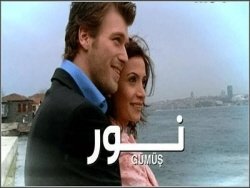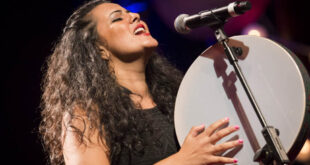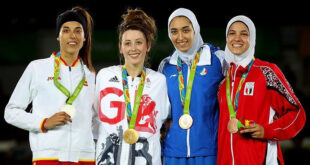Dubbed Turkish soap operas conquering the Arab world:
social liberation or cultural alienation?
In 1980 oil magnate J.R. Ewing was shot and injured in the hit series Dallas, which featured an unconventional family’s struggles over power, wealth and sex. The shot was heard around the world, with millions of fans desperately wondering “Who shot J.R.?”. It was the first time that a TV series had captivated simultaneously so many people around the world. Five years later, the Arabs were shooting at the stars with the launch of the first Arab satellite system, Arabsat-1. Except for experts and visionaries, no one was predicting that it was “the beginning of the end” for the state domination of television in the Arab world.
Almost a quarter of a century later, on August 30, 2008, 85 million Arab viewers were glued to their TV sets for the finale of the Syrian-dubbed Turkish soap opera, Gümüş1 (Noor2 in Arabic), a Kanal D production that received little attention in its homeland in 2005. After falling in the past for Victoria Principal, Ridge Forrester, and Latin American telenovela characters Kassandra and Rosalinda , Arab audiences are now turning to Turkey, a close yet estranged neighbor with whom they share a tumultuous history.
The mastermind behind this phenomenon has been the MBC (Middle East Broadcasting Center) media empire, a combination of Saudi capital and Middle Eastern know-how, and a success story that started in the 1990s with the birth of a private Arab media field. As Naomi Sakr explains, many factors fuel the field’s potential including the fact that “Media flows are (…) facilitated where the language is shared3”. The Arab market is indeed unique: a large and essentially young audience with some 20 countries sharing a common language. Researchers have thus observed a relative “depoliticization” of media over the years with the progressive development of mass entertainment programming.
Despite the spectacular success of Arabic musalsalat (soap operas), Arab audiences have always shown great interest in foreign productions. Within this context Turkish soap operas, Noor being the most significant case, have generated a media revolution. My aim is first to describe this triumph and then to introduce the various repercussions that resulted from it. On one hand, it would be interesting to analyze this new form of drama on the Arab entertainment scene, explaining its emergence as a “genre” as well as a successful model of “hybridization”. On the other hand, in a region of long Ottoman domination, what linguistic and cultural issues do these series and their dubbing in dialect raise? What have they exposed about Arab societies in terms of values?
I will tackle these aspects through a close analysis of the Arab press from March to July 2009, the period that witnessed the peak of the series’ success. The analysis will include general literature about soap operas formats as well as musalsalat in the Arab world.
Moreover, I shall draw conclusions about Arab drama and entertainment as a whole, as well as its inherent contradictions, mostly in terms of values. Finally, I will discuss the next trends within this field as well as Arab satellite media in general, including the possible return of local dialects after the domination of standardized Arabic.
The advent of a “genre”: Turkish drama
Initially, soap operas were radio programs sponsored by big soap corporations in the United States. With the advent of television, they became a well-known format all over the world. They were aimed at housewives and were mostly aired in the “daytime slot”, from 9 a.m. to 4 p.m., according to A.C. Nielsen’s dayparts. Women’s access to the labor market and the dazzling success of some series however brought many changes. Soap operas were thus moved to “prime time”, from 8 to 10 p.m., where viewership peaks, and no longer targeted an exclusively female audience. Dallas, Beverly Hills 90210, and Melrose Place became symbols of such decades.
MBC began broadcasting Turkish series dubbed in Syrian dialect in 2007 with Iklil al Ward4 (“Crown of Flowers”). In February 2008, MBC 1 aired Sanawat al Dayaa’5 (“The Lost Years”) from Wednesday to Saturday at 4 p.m., corresponding to “regular time” in MBC dayparts. In April 2008, the press began noticing the audience’s growing interest with the presence of TV sets in cafés, important socialization spots in Arab countries, as well as downloads of the series’ opening theme songs. Simultaneously MBC, with an efficient marketing strategy and extensive press coverage launched Noor at 2 p.m. Audiences could now watch two Turkish series and discuss them. By the end of April, Noor rose to prime time on MBC4, at 9:30 p.m., between the very popular Oprah Winfrey Show and the daily evening film. With this domination of prime time and the audience’s enlargement, “Noor mania” began and the fate of Turkish series became similar to signature soap operas.
Explosions in viewership confirmed these trends. Indeed, MBC spoke of 3 to 4 million viewers per day in Saudi Arabia6. Mazen Hayek, Director of Marketing, PR and Commercial Affairs ,at MBC Group spoke at the Second New Arab Woman Forum in Beirut (NAWF) of “85 million viewers (for the Noor series finale) above 15 years of age in the Middle East and North Africa region, out of whom 50 million were female”7. Sanawat al Dayaa’ came in second with 67 million viewers, 39 million of them female. The Noor series even managed to conquer a spot in the top 10 global programs in the Eurodata annual study “One Television year in the world” by Médiametrie8.
The press also reported odd reactions to the series from all over the Middle East: from deserted streets in Al Khalil (Hebron) and Gaza to female mobs in Dubai9 and Jordan along with a fit of newborns named Noor and Muhannad after the heroes of the series. The craze also included an economic dimension with best-selling t-shirts and posters. The sales of these goods sometimes even surpassed those of Arab leaders like Saddam or Yasser Arafat in Gaza.10
Soap operas can be distinguished by their specific narrative form. These characteristics include overlapping intrigues that are highlighted by the end of each episode and a community of characters with dynamic and complex interactions. Romantic and sexual relationships are central among the issues tackled, as are family ties. Moreover, the plot usually highlights emotional and moral conflicts. The Noor series fit this model perfectly. Events included a life-changing arranged marriage cum love story between the main character, Noor (Songül Öden) and Muhannad (Kivanç Tatlitug), the young and handsome heir of a business empire. Noor had to face several obstacles in her love life (including a triangular relationship with her husband’s ex-lover) but also in her career as a woman struggling to establish herself in the workplace. The series were marked by several coups de théâtre – the return of dead characters, revelations of family ties and missing children, all emblematic ingredients as explained by Laura Stempel Mumford in Love and ideology in the afternoon: soap opera, women, and television genre (1995). Class struggle also makes appearances, especially in Sanawat al Dayaa’. Shooting sites are traditional soap opera locations: an Ottoman palace on the Bosporus, a fashion company, restaurants and hospitals.
An innovative aspect is added however: the “Turkish touch”. Like telenovelas, Turkish series carry a certain identity and cultural values that are amplified by several elements. The patriarchal model is essential and is emphasized in several scenes through the domination of the wise head of family; in Noor, this happens to be Muhannad’s grandfather, Fekry Bey. All episodes include scenes of family meals headed by Fekry Bey as well as Turkish coffee gatherings where he plays the lute.
Because of the viewership explosion and the importance of the “Noor” phenomenon -- both its extent and the intensity of its fan activity -- Mazen Hayek talks about the birth of a genre: “Turkish drama”11. Turkish series have dethroned their Mexican rivals which had ruled Arab screens in the 1990s. Like telenovelas, Turkish soap operas can be considered as hybrid by combining typical characteristics of classic American soaps as well as new cultural inputs. It is thus essential to explain what the Arabic translation has added to the show, focusing particularly on the use of dialect when dubbing.
From Gümüş to Noor: linguistic considerations
Translation is a mode of representing identity and triggers a linguistic, philosophical and commercial debate. Each language represents a different vision of the world characterized by its means and values. Several cultural studies scholars have taken this idea into consideration when studying media. Indeed they discussed the public’s reappropriation of mass media entertainment products. There are several ways to translate films or series: subtitling “a transposition from sound into writing” and dubbing “an audiovisual expression with one language seen, another heard”12. Both techniques involve synchronization: “the number of syllables as well as the duration of the spoken line is supposed to correspond with the original” (Rossholm 2006). Translation involves a combination of languages and media.
In Arab media, translations are mostly done through subtitling. As for dubbing, Robert Stam explains that accents and intonations are also essential as they convey cultural and linguistic differences13. When it comes to Arabic, the diglossia of the language is an essential characteristic to consider. It results in major differences between “literary” Arabic (a language that is not mastered by a part of the population) and colloquial Arabic or dialects, the language “of the street” and daily life. The expansion of media has led to different phases of linguistic hegemony. In the early 1990s, Arab musalsalat productions were dominated by dialects, essentially Egyptian. This position can be explained by Egypt’s long cinema history, dating to the beginning of the 20th century, as well as the abundance of Egyptian productions.
The emergence of Al Jazeera would, however, level the playing field, introducing a standardization of literary Arabic in order to help viewers who did not master it. This innovation would also have an impact in the field of entertainment. First, brief incursions of literary Arabic in local productions increased, although the field was traditionally dialectal (such as the Syrian hit series Bab al Hara). Then came MBC’s successful gamble: having Gümüş dubbed into Syrian dialect by Sama production studios in Damascus. This choice challenged the traditional literary Arabic dubbing of Mexican telenovelas that had created a disconnect between the audience, which found the language too complex and inadequate for the scenario, and the series over the years. Dania Nugali, a 16 year-old Saudi, told John Dagge from The Middle East magazine that when she watched telenovelas dubbed in classical Arabic she felt “like (she was) in an Arabic literature class (…) but when I watch Noor, I definitely feel that it is entertainment."14.Most fans who gathered in front of the MBC building when Noor‘s stars visited Dubai agreed with Dania. Therefore, MBC’s use of Syrian dialect was not an obstacle to Noor’s success, but was, on the contrary, one of its main assets, despite the important differences between Syrian dialect and other Arabic dialects.
With accessible language, Arab viewers discovered “the Other”, a neighboring country that history had estranged. Indeed Arab nationalism was essentially a reaction to Turkish cultural hegemony after the Young Turks’ revolution. By “winning hearts and minds”, Noor triggered a sudden reawakening and consideration of these Sanawat al Dayaa’ (“lost years”) as well as several other dilemmas.
The Ottoman Empire strikes back?
Turkish-dubbed series were undeniably an essential factor that led to a reevaluation of Turkish culture by Arab audiences. A feeling of proximity between both societies, Arab and Turkish, that was found neither in Mexican telenovelas nor in American hit series, flourished.
When interviewed by the Jordanian newspaper Al Ghad, sociology professor Hussein Al Khozai stated that Arab viewers could identify with many of the values conveyed by the series, such as respect for elders such as Noor’s grandmother, but, more importantly, the centrality of the head of the family, Fekry Bey. This essential component of Arab societies can be found in several fictional works such as Naguib Mahfouz’s landmark character, “Se Sayed”, in the Cairo Trilogy.
The emphasis on Turkish landscapes when filming also touched Arab viewers. Instead of filming in studios, as in most Arab series, many sequences were filmed on the Bosporus in Noor and in Sanawat Al Daya’, allowing viewers to travel through the Turkish countryside. Such scenes lured tourists to Turkey. Figures from the Turkish Ministry of Culture and Tourism15 reveal a steady increase in tourism from Arab countries, with the most significant increases from Gulf countries, including a 34 percent Saudi increase – including important members of the royal family, a 75 percent increase in Kuwaitis, 51 percent more Emiratis and over 1,379 percent more Omanis. The palace where Noor was filmed on the Bosporus was rented and transformed by tour operators into a sort of lovers’ museum destined for Arab tourists. Other more ambitious fans chose to learn Turkish16. Journalist Naji A’mayrah describes the series as “the missing link” between Arab and Turkish societies.
Yet such enthusiasm for shared perspectives was, however, far from unanimous. Many journalists spoke of the success of Noor as “Turkish hegemony”17. Mohamed Mansour wrote in the pan-Arab newspaper Al Quds Al Arabi that he was outraged by “televised alienation”18, labeling Noor an extension of previous Mexican “assaults” on Arab culture which began in the 1990s. Turkish series are also interpreted through the contemporary political context. Indeed, through a committed and effective foreign policy, Turkey has demonstrated its desire to play a paramount regional role. Prime Minister Recep Tayyip Erdogan has, for example, successfully seduced the Arab public, who have compared him to Saladin, known as the hero of resistance to the Crusaders, through his drastic position on Gaza (a landmark issue of Arab nationalism) at the Davos World Economic Forum. Turkish series can be seen by some as a soft power instrument to win over Arab public opinion. Mansour also adds an analysis of a Muslim world that is marked by creeping sectarianism. He denounces “Shia opportunism” with Iranian series being dubbed on Shia channels, inflicting a “Shiitization” upon Muslim societies.
Challenges are not limited to the ideological field. From a commercial point of view, the Turkish entertainment industry “is a US$6-billion a year business”19. MBC saw it as an “opportunity” according to Fadi Ismail, the general manager of O3 Productions, a subsidiary of the MBC Group. Turkish series are less expensive and more lucrative than Arab productions. According to the Syrian director Abbas Al Nouri, the success of Turkish drama is a “challenge”20 for Arabic musalsalat, but also a source of inspiration emphasizing romance and feelings in future scenarios. Other directors, like Egyptian star Osama Anwar Okasha commented on the phenomenon ironically, by predicting the arrival of “Eskimo” series on Arab screens.
The month of Ramadan, where television consumption traditionally doubles, is a relevant example illustrating this feeling of “assault”. The triumph of Turkish drama has triggered a backlash: the proliferation of hundreds of Arab musalsalat airing on a large selection of over 300 channels.
Muhannad and Noor, trouble-makers of the small screens
Syrian dubbing did not only translate, it transposed and adapted. Many significant modifications were made, beginning with the Arabization of the characters’ names. In the Turkish version, the main character’s name is Mehmet, but Sama group translators preferred Muhannad, an ancient and rare Arabic name, portraying a desire for uniqueness. Other rearrangements were more drastic, concerning both the format and the content: the series initially had 100 episodes of one hour each. When aired on MBC, there were 154 episodes of 45 minutes each. Several erotic scenes were censored because they were considered inappropriate and incompatible with the region’s values. This censorship was nevertheless insufficient for some newspapers such as the Saudi Al Jazeera, which described the broadcast of Turkish drama as an assault on public decency.
The usual condemnations of soap operas were added to these grievances. For Said Abul Mee’la of the Jordanian newspaper Al Ghad, the success of Turkish series is a “scam” and a proof of Arab decadence. Other journalists resented the script’s triviality and lack of innovation. Such tendencies serve as a reminder of Ien Ang’s study of the cross-cultural reception of Dallas in the Netherlands. She speaks of the “ironic pleasure of hating Dallas or disliking the values they see it representing so much that they enjoy watching the show in order to condemn and ridicule it.”21Ang speaks of “pleasure in displeasure” -- an implicit critique of American pop culture in Dutch society, confirming what some researchers called “the paradox of soap operas” -- one of the most significant TV triumphs of the last fifty years. Despite being an ultimate advertising space, they remain one of the most criticized formats in pop culture.
By June 2008, a different type of news related to Turkish soaps dominated popular imagination in the Arab world. One of Noor’s main assets was the young and handsome Kivanç Tatlitug, an ex model and winner of the Best Model of the World award in 2002. His Western features and role as the romantic and sexy husband earned him the nickname “the Middle East’s Brad Pitt”22. Tatlitug became a real star, and made several ads and a music video with Lebanese singer Rula Saad. He triggered many marital crises, as Arab women made the painful comparison between Muhannad and their husbands, demanding more romance and respect in their relationships. Several divorce cases were filed, some of them repudiations out of jealousy and others of them ultimatums given by women23. Noor thus served as the detonator of existing matrimonial and sexual tensions all over the Middle East. Turkish series also featured several independent, non-veiled female characters, ranging from working women to single mothers, the opposite of a desperate housewife. Charlene Gubash from NBC news consequently spoke of “upend(ing) traditional Arab gender roles”24.
The complaints of Noor’s female viewers also fit several scholars’ application of feminist theories to soap operas. They claim soap operas give women a medium to escape the daily routine of their lives and the stress family life might bring. The escapist dimension of soap operas is even more noticeable in war-torn societies such as Gaza or Yemen and those facing daily violence, as in Iraq, where streets were deserted during the daily broadcasting of Noor.
“Satanic series”? – Facing Turkish secularism
Alcohol, abortions and premarital sex are all ingredients of Turkish soaps but are also the nightmares of the religious establishment in the region. The most notorious controversy regarding Turkish series was the virulent objections of several clerics. Despite the reorganization and the censorship of the series, several remaining aspects were seen as contrary to Islamic principles. In June 2008, Saudi sheikh Salman al A’awada, host of a religious program on MBC, advised the “owner of MBC to revise and censor Noor episodes.”25 The idea of a cultural bridge was denied, and Turkish secularism was questioned. A series of fatwas forbidding the faithful from watching Noor or Sanawat al Dayaa’ went along with this indignation. Syrian sheikh Hamdi Kanjo Al Makzoumi declared that praying in T-shirts featuring any of the Turkish actresses was haram, calling them “non-veiled and decadent, promoting vice and decadence in places of worship”26.
A few days later, the grand mufti of Saudi Arabia, Sheikh Abdul Aziz Al Sheikh, the official voice of the Saudi religious establishment, forbade the “wicked and evil” Turkish series that represented “an assault of Turkish secularism on Saudi society”. The most notorious controversy was, however, the Sheikh Saleh al-Lohaidan affair. Lohaidan, the head of Saudi Arabia’s Islamic Sharia courts and one of the most powerful clerics in the kingdom, declared that “the owners of these channels that broadcast programs containing indecency and vulgarity (…) can be put to death through the judicial process (qada’an)”. Such fierce accusations created a political storm and consequent media coverage, as most satellite channels are owned by Saudi media moguls linked to the royal family27.
Conclusions
The genesis and triumph of the “Turkish drama” genre raises several dilemmas inherent to the Arab world. Series like Noor are a successful model of hybridization, firstly because of their handling and editing by MBC. Turkish soaps have been successfully adapted to a conservative environment not only by linguistic transformation but also through a content metamorphosis that was reinterpreted by the Arab societies’ most conservative components. Viewers have also actively contributed to this success with the massive use of new media: blogs, fan fiction, websites and phone numbers for ringtones and wallpaper downloads, as well as a wealth of Facebook fan pages, groups and YouTube videos.
Turkish drama and Arabic musalsalat carry strong cultural identities and Turkish drama has helped promote cultural exchange. Television is an essential vector of modernity in the region, and, as in Latin America, has actively thrown light, in the public and virtual spheres, on major social problems affecting Arab societies from Morocco to Bahrain, despite their diversity. The public’s passion and strong reactivity to an imported genre has triggered strong reactions, from skepticism to indignation and violence.
Despite the religious controversies, Turkish soap operas seem to be here to stay, at least for now. MBC continues to dub and broadcast new Turkish series28 and intends to apply dubbing in Arabic dialects to other genres. It has even launched a pay per view channel called MBC+ drama, broadcasting 24 hours of uninterrupted Turkish and Arabic drama. Exchanges are not limited to imports but also exports: MBC is closely following the Turkish market and has successfully exported the Syrian musalsal, Salah Eldine el Ayoubi, a biopic on Saladin that was dubbed into Turkish and has enjoyed great success. Other networks such as the Moroccan 2M have followed the trend and started airing telenovelas in Moroccan colloquial in the summer of 2009. The use of dialect when dubbing marks a return to localism on transnational television after the long domination of literary and then standardized Arabic. Dialect has also penetrated other formats such as political talk-shows, also witnessing a soaring success in Egypt and Lebanon, for example.
Finally, the rise of soap operas à la turque has resulted in a reevaluation of the Arab entertainment industry, a sudden and difficult awakening for a field that was long dominated by the state. The Arab media space is witnessing major changes with the daily birth of new satellite channels. Since the launching of Arabsat 1, several media empires have risen, offering a broad selection of programs aimed at the populous Arab region in all its diversity.
The Arab entertainment field is simultaneously a goldmine and a minefield, unveiling a sort of schizophrenia between tradition and modernity. Media empires are mostly financed by capital from traditional Gulf monarchies which impose their brand of conservatism in Arabic musalsalat. Nevertheless, the acquisition and success of series like Noor reveal the desire and the need of an essentially young population for social change. Arabic musalsalat also need new blood to replace ageing stars. A superficial liberation is discernible through the abundant production of highly sexualized and suggestive music videos featuring libidinous female singers.
A Cairo court recently called on the government to apply a verdict in Egypt that forbids all “immoral” websites, a regulation that is already enforced in several Gulf countries that spend billions of dollars on firewalls. From tele-Quranism to reality television, along with steamy music videos and soap operas, open skies seem to be the most difficult space to dominate. Satellite channels will thus continue their ascension.
Alexandra Buccianti is a student at the Institute of Political Sciences in Paris (Sciences-po) in the Comparative politics graduate research program. She is preparing an M.A. thesis about Egyptian talk-shows and new Arab media.
 Arab Media & Society The Arab Media Hub
Arab Media & Society The Arab Media Hub





